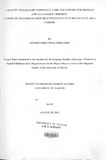| dc.description.abstract | Capacity building of community grassroots OVC initiatives is crucial for effective and
sustainable service delivery. This study examines how and the extent the capacities for care and
support of community-level Self-Help OVC initiatives in Pumwani are being strengthened. The
study explores the nature and scope of the OVC care and support; types of capacity building
organizations and strategies; outcome of capacity support on service delivery; and lastly,
community grassroots perception of change in OVC care and support.
This study adopts a case study strategy with a qualitative research approach. Maximum variation,
snowballing and purposive sampling techniques are used to select the units of analysis and the
respondents. The study utilizes primary and secondary data; and thematic analysis technique of
data analysis.
The study draws six conclusions based on findings. First, the Self-Help OVC initiatives are
heterogeneous institutions in constant transformation to complex organizations and with
potential for OVC care and support. Second, youths and children have emerged as new actors in
OVC care and support. This is accompanied by emergence of new services such as talent
development, sanitation, and legal assistance. Third, the main capacity building organizations are
Non-Profit Organizations (NPO) and government agencies. Participation by the for-profit sector
in capacity support for community OVC initiatives remains limited. Fourth, training in key
programmatic areas is the most sustainable capacity building strategy. Other strategies such as
resource support (financial and material), on-site support visits, exchange visits, partnerships,
and networking are less prominent and their support unsustainable. Moreover, the
implementation of capacity support is largely fragmented and tends to focus more on improving
care and support programs rather than strengthening the OVC organization. Fifth, capacity
support resulted to improved service delivery by the OVC initiatives. However, overall the
initiatives remain generally weak to provide comprehensive and sustainable care and support.
Finally, despite community grassroots perception of improved OVC care and support, the
services provided are perceived as inadequate. In addition, OVC with disability are still
disadvantaged in accessing care and support services.
The study suggests five key recommendations for policy and further research. First, there is need
for policymakers and practitioners in OVC care and support to design an integrated capacity
support implementation framework that also incorporates initial capacity assessment of the OVC
initiatives. Second, the study recommends the need for the stakeholders and practitioners to
review capacity support approaches to equally focus on strengthening the OVC organization.
Third, the study recommends the need for policymakers to review the National OVC Policy and
the National Plan of Action to enhance participation by the for-profit sector in capacity support
of community-level OVC initiatives.
Additionally, the study suggests two recommendations for further research. First, there is need to
investigate the new institutions in OVC care and support in Pumwani Slum Area such as the
Children’s Parliament and the grassroots Child Rights Clubs to establish their roles and
effectiveness. Second, conscious to contextual dynamics, this study recommends need for
replication of the study in other settings across the country to establish variations in capacity
building organizations, strategies employed, and the outcome of capacity support on service
delivery. | en_US |

